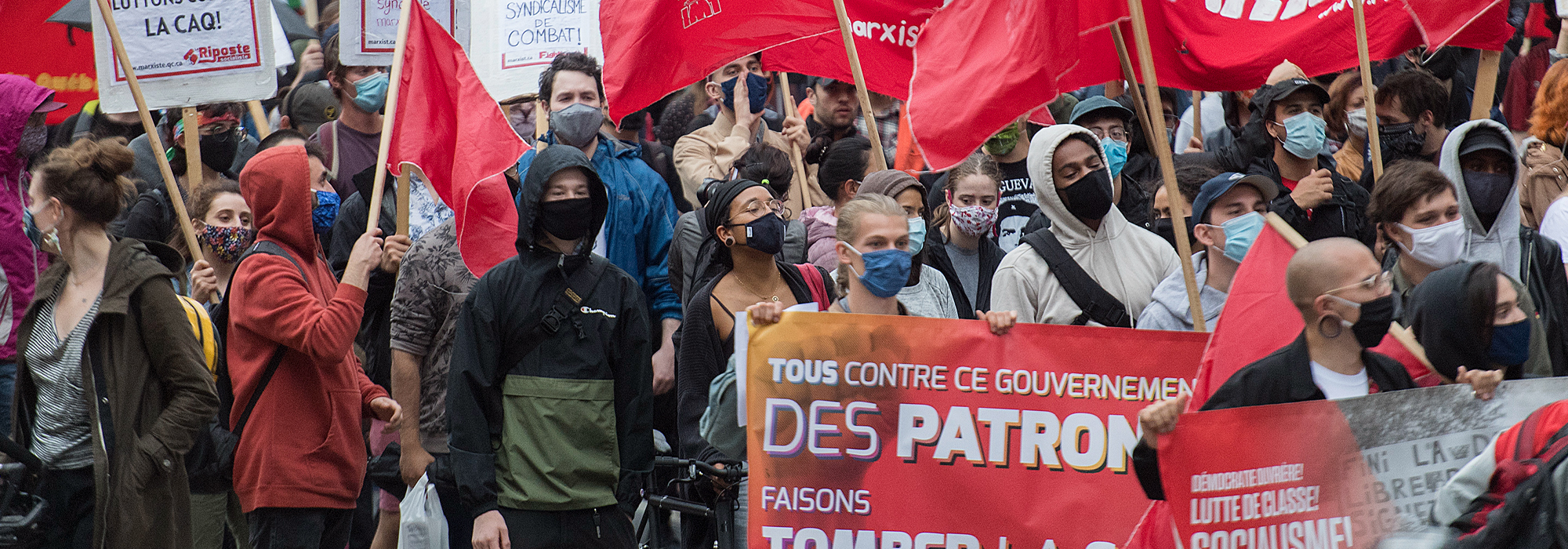
Reported cases of abuse and murder of people from visible minority groups at the hands of police forces across Canada persist today. Yet, by and large, Canadian police unions have been opposing or watering down efforts to address discriminatory policing practices and unbridled growth in police funding for years. Since 1999, even during times of budget cuts and cutbacks on social expenditure, there’s been a steady increase in real expenditure on policing over the past three decades, according to Statistics Canada.
Last year, unions across Canada issued statements against racism. In October 2020, the Canadian Labour Congress (CLC) exhorted unions to join the fight to defund police. The CLC argues that defunding the police would strengthen long-underfunded social service and public service sectors, as well as help in the fight against racism and violence in policing communities.
Right now, there’s an opportunity to make the goal of defunding the police part of union negotiations and the work of the broader Canadian labour movement – and we should seize it. Before that happens, however, unions must look inward. They should ask themselves: What can we in the labour movement do to address the power of police unions and associations? What steps can we take to address structural racism within institutions across Canada?
Unions and structural racism
In Canada, the wage gap in the highly unionized public sector is smaller than in the mostly non-unionized private sector. According to research published by Canadian professors Gerald Hunt and David Rayside, unions here have been more responsive than their American counterparts on issues of equity. Indeed, they have some of the largest settlements on equity in the country, and the Public Service Alliance of Canada (PSAC) is currently supporting a class action lawsuit to address systemic discrimination in the public sector.
That said, data shows that the wage gap between visible minorities and white Canadians in unions persists over generations in Canada. A recent study published in International Migration Review examines the ability of newly arrived non-white immigrants to access union jobs and the impact of unionization on their earnings. The study’s findings are disturbing because not only do non-white immigrants have less access to union jobs, the positive impact of unionization on earnings is somewhat lower for new non-white immigrants than for new white immigrants. The study concludes that unionization does not contribute to reducing the earnings gap of new non-white immigrants relative to white immigrants and native-born Canadians of any background. We need to expand this kind of research to other marginalized and visible minority communities, such as First Nations, and then work on addressing the aforementioned gaps.
A more difficult problem to address is how we root out the structural injustices that are now normalized in collective bargaining agreements, grievance-handling and other union processes. The wage gap between unionized visible minority members and unionized white male members is much smaller than the gap between all visible minority workers and white workers – but it still exists. There are also other issues, such as access to what are considered better positions for members with more seniority, who tend to be disproportionately white, as well as the preponderance of visible minorities in precarious work that’s sometimes contracted out by public sector employers.
In the United Kingdom, the Trades Union Congress (TUC) launched an anti-racist task force, which has done work that’s worth emulating in Canada. TUC is compiling decades of research conducted by U.K.-based unions, as well as researchers and analysts, to promote more effective anti-racism work within these unions. It’s also been surveying union members to ask about discrimination at work, looking at structural racism in union practices and perception, as well as why sometimes cases go unreported. Now that London has declared its city hall to be an anti-racist organization, TUC will leverage its work to develop policies and make this declaration a reality.
As policy-makers, the most difficult question for any union to answer is what to do when marginalized communities report that members are complicit in practices that are racist. When it comes to complaints about individual members, unions have a duty to represent those individuals during the grievance process, but as Public Service Alliance of Canada (PSAC) points out, that doesn’t mean the union must represent the individual over the needs of the collective or those of marginalized communities. Union-bargaining agents and stewards must be reminded of this when they defend reprehensible behaviour.
Carceral unions and the labour movement
Since police and corrections officers first sought recognition as bargaining agents, they faced widespread opposition from different stakeholders. Many governments and businesses felt that police forces, which are an essential service to maintain law and order, shouldn’t be allowed to organize and withhold their labour to demand improvements to their work conditions.
Meanwhile, social justice and workers’ rights activists who faced repression and violence from police organized to keep them out of labour federations (for the most part, police associations and unions aren’t affiliated with the Canadian Labour Congress, except in the few cases where police forces chose to be represented by larger public sector unions).
An important aspect of demanding justice for visible minorities is demanding justice in policing. How do we influence the actions of police unions and their members? How do we stop them from obstructing efforts to change discriminatory police practices and create oversight? Is there any way they can become partners in the effort to defund police?
Currently, there are movements in Canada to demand the expulsion of police and correctional officers from unions affiliated with the larger labour federations, such as PSAC and the Canadian Union of Public Employees (CUPE). But this gesture, if made, would be largely symbolic because the lion’s share of police unions aren’t part of Canada’s labour federations. Indeed, many call themselves associations and bargain outside of the labour movement. If expelled, the correctional officers and police in unions affiliated with the labour federations could easily form powerful independent bodies or join the majority non-affiliated police associations. Currently, the Ontario Public Service Employees Union (OPSEU) is facing a campaign by its member correctional officers to disaffiliate and create an independent corrections-only association.
As Ryan Hayes points out in Briarpatch Magazine, “In the United States, along with the call to expel police unions from the American Federation of Labor and Congress of Industrial Organizations (AFL-CIO), policy analysts have made the case for barring police associations from the right to collectively bargain. Others have called for limiting the scope of their bargaining to strictly wages and benefits.” But how will restricting the power of police officers to organize prevent the prison industrial complex from growing and further influencing policy, and disproportionately imprisoning racialized people? The right to bargain collectively is a universal right, not limited by ideology, so won’t attempts to curtail it set a dangerous precedent?
There are many union members who have been leading and coming out in support of movements against racism. However, many join as volunteers without bringing their local union or the larger labour movement along. In 2020, deaths at the hands of police in Canada and the United States made the call for defunding the police more urgent. The fact that the Canadian Labour Congress has issued a statement saying that unions should join the fight to defund the police is an opportunity. This statement is an opening for us, the progressive union members, the majority of whom work in the public sector, to bring the force of our locals and our unions to the fight against police violence.
If defunding police is officially adopted as a part of a union’s work, unions could bring staff resources, relationships with politicians and their staff, intimate knowledge of how to lobby and move different political bureaucracies to the movement. If the movement for racial justice successfully defunds police, it would grow long underfunded social service and public service sectors and budgets again, which makes economic sense for our locals and unions.
Successfully dismantling structural racism in police unions and in our work as unions more broadly will take sustained effort. Last year, many Canadian unions made important statements and launched renewed efforts toward these goals, but we must be willing to commit to making them a reality.
This article is part of the Identifying the Barriers to Racial Equality in Canada special feature.









